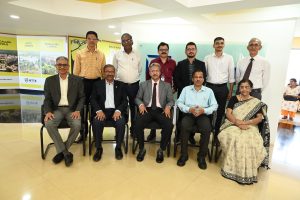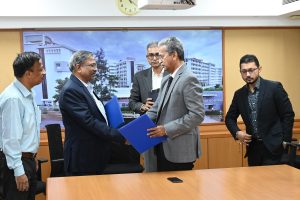SRMAP Scholar wins best oral presentation award in International Conference
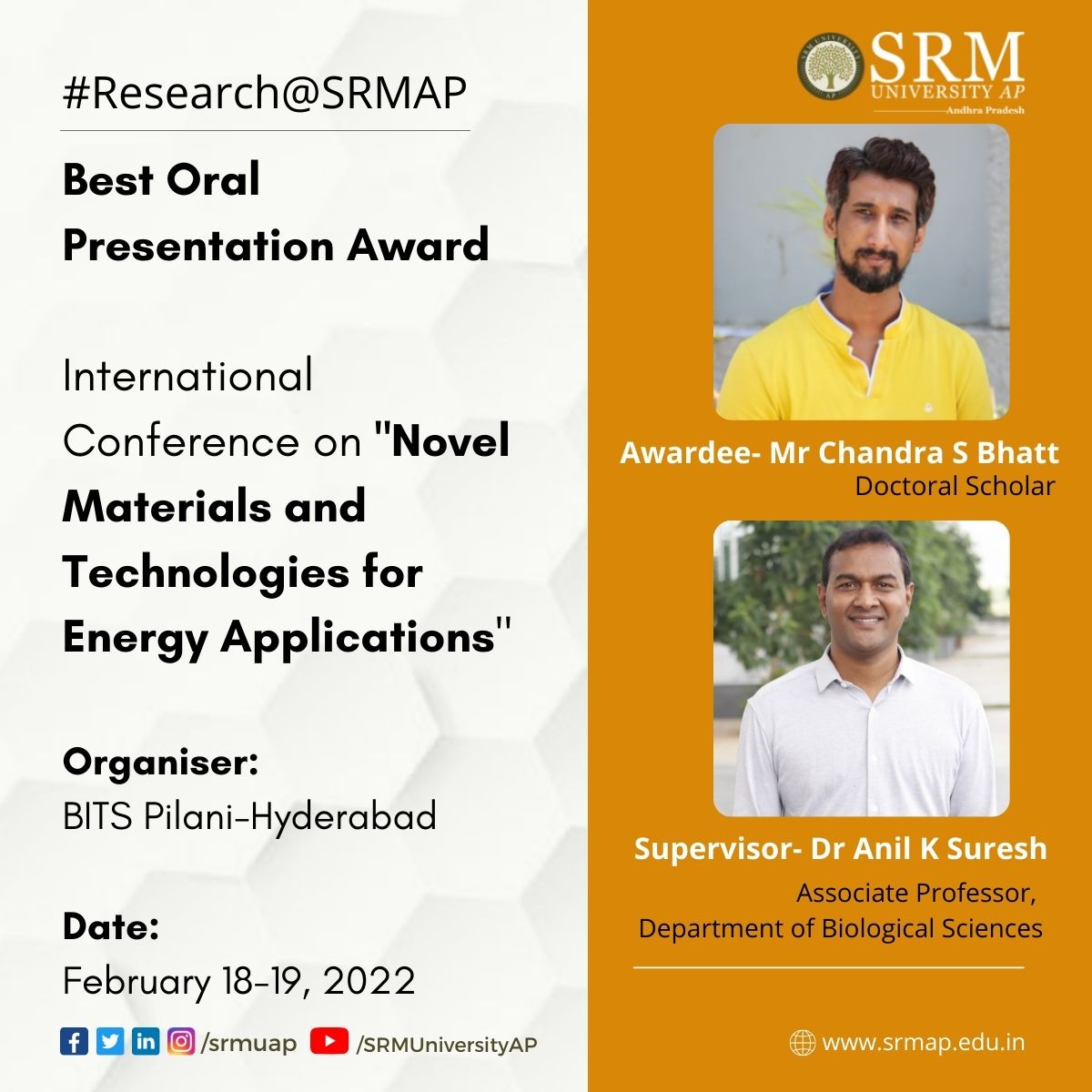 Mr Chandra S Bhatt, a PhD Scholar (CSIR-JRF) working under the guidance of Dr Anil K Suresh, Associate Professor, Department of Biological Sciences, has won the Best Oral Presentation Award at the International Conference on “Novel Materials and Technologies for Energy Applications,” organised by BITS Pilani-Hyderabad, on February 18-19, 2022. Prof Ashutosh Sharma, Former DST Secretary & Institute Chair Professor, IIT Kanpur, was the Chief Guest of the Conference.
Mr Chandra S Bhatt, a PhD Scholar (CSIR-JRF) working under the guidance of Dr Anil K Suresh, Associate Professor, Department of Biological Sciences, has won the Best Oral Presentation Award at the International Conference on “Novel Materials and Technologies for Energy Applications,” organised by BITS Pilani-Hyderabad, on February 18-19, 2022. Prof Ashutosh Sharma, Former DST Secretary & Institute Chair Professor, IIT Kanpur, was the Chief Guest of the Conference.
Abstract:
Mr Bhatt’s project aims to develop the best out of waste, which is practically demonstrated by synthesising gold nanostructured eggshell-based supported catalyst. Besides this novel strategy, the megacatalyst is implemented in the real-time degradations of organic and sewage dyes that are harmful to the environment and hydrogenation of nitroarenes at gram-scale (precursors for various pharmaceutical ingredients). Our rationale, naturally created, stable, reusable, hand-removable, resilient catalyst developed from left-over food waste trounces the majority of the existing challenges while utilising nano-based catalysts for heterogeneous catalysis.
With this innovation, Mr Bhatt aims to demonstrate pilot-scale (100-1000 litre) batch catalytic reactions for real-time textile sewage dye detoxification and gram scale hydrogenation of pharma-precursor for the production of acetaminophen, as a step of validation for immediate technology transfer and commercialisation for both environmental remediation and active pharmaceutical ingredients (API’s).
About the Author:
Mr Bhatt aims to continue his scientific career as a prominent scientist in the interdisciplinary area of nano-immunology for cancer theragnostics. Therefore, after the completion of his PhD, he wishes to advance his research career to contribute further to the realm of science upon postdoctoral training from a top-ranking institution abroad.
“It is indeed a moment of pride for me to be awarded the Best Oral Presentation Award in an International Conference organised by BITS Pilani, Hyderabad, winning over 30 participants across the Nation. I express my heartfelt gratitude to my supervisor Dr Anil K Suresh, for his guidance and motivation me throughout the journey,” said Mr Bhatt.
While expressing his joy, Dr Suresh emphatically said, “This was his first oral presentation in an International Conference, and he was conferred with the “Best Oral Presentation” Award. This recognition speaks for Chandra Sekhar’s dedication to his research. He has been working enthusiastically on this project, and I wish that the paper gets published in a high-impact journal which has already been communicated for Shekar’s bright scientific career.”
- Published in Biology News, News, Research News, Students Achievements
Journey of BSc Integrative Biology student to QS ranked universities
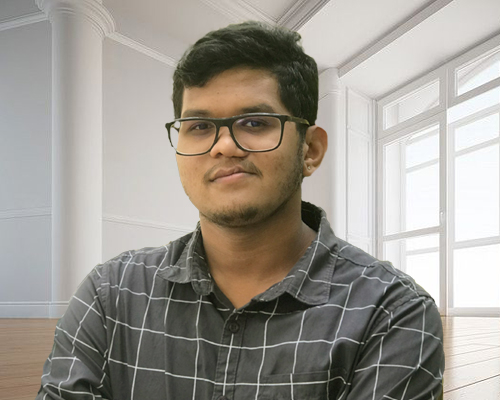 Our bright young minds bring fame and glory to the university from all around the world. Mr Haseesh Rahithya Nandam, from the final year of BSc (Hons) Integrative Biology, has received admission offers to MSc Infection and Immunity course, University College London (QS ranking 8) and MSc Medical and Molecular Virology, The University of Manchester (QS ranking 27).
Our bright young minds bring fame and glory to the university from all around the world. Mr Haseesh Rahithya Nandam, from the final year of BSc (Hons) Integrative Biology, has received admission offers to MSc Infection and Immunity course, University College London (QS ranking 8) and MSc Medical and Molecular Virology, The University of Manchester (QS ranking 27).
UCL is rated the top university in the UK for research strength in the most recent Research Excellence Framework. The MSc course that Mr Haseesh has enrolled in primarily focuses on teaching concepts of infection and immunity. It contains course modules such as Molecular Virology, Evolution of Diseases, and Epidemiology.
“I am excited and happy since UCL stands in 8th rank and offers a course I dearly love to study”, says Mr Haseesh. According to him, the selection process for University College London was a piece of cake. The admission requirements were the English language proficiency test (IELTS/TOEFL) result, SoP, LoRs, CV, and Grade Card. He has also applied to Imperial College London and is waiting for the admission announcement.
SRM University-AP enables students to become the best version of themselves every single day and work towards their goals. “I am grateful for the support of my professor Dr Sutharsan Govindarajan to work in his lab. There, I got the opportunity to gain experience and learn new things”, says Mr Haseesh. He further thanked the Head of the Department, Prof Jayaseelan Murugaiyan, for his relentless guidance and support.
- Published in Biology News, Departmental News, News, Students Achievements
Interdisciplinary research and the integration of perspectives
Assistant professors Dr Sabyasachi Mukhopadhyay and Dr Imran Pancha from the Department of Physics and the Department of Biological Sciences, respectively, along with Ms Ashwini Nawade, a PhD student of the Department of Physics, have developed a method to integrate plant proteins in the solid-state electronic circuits and utilize the biological functionality to produce a thin film, cost-effective photodetector. Their paper entitled Electron Transport across Phycobiliproteins Films and its’ Optoelectronic Properties has been published in the ECS Journal of Solid State Science and Technology with an Impact Factor of 2.07. It is an interdisciplinary research project between the Department of Biotechnology and Physics.
Explanation of the research
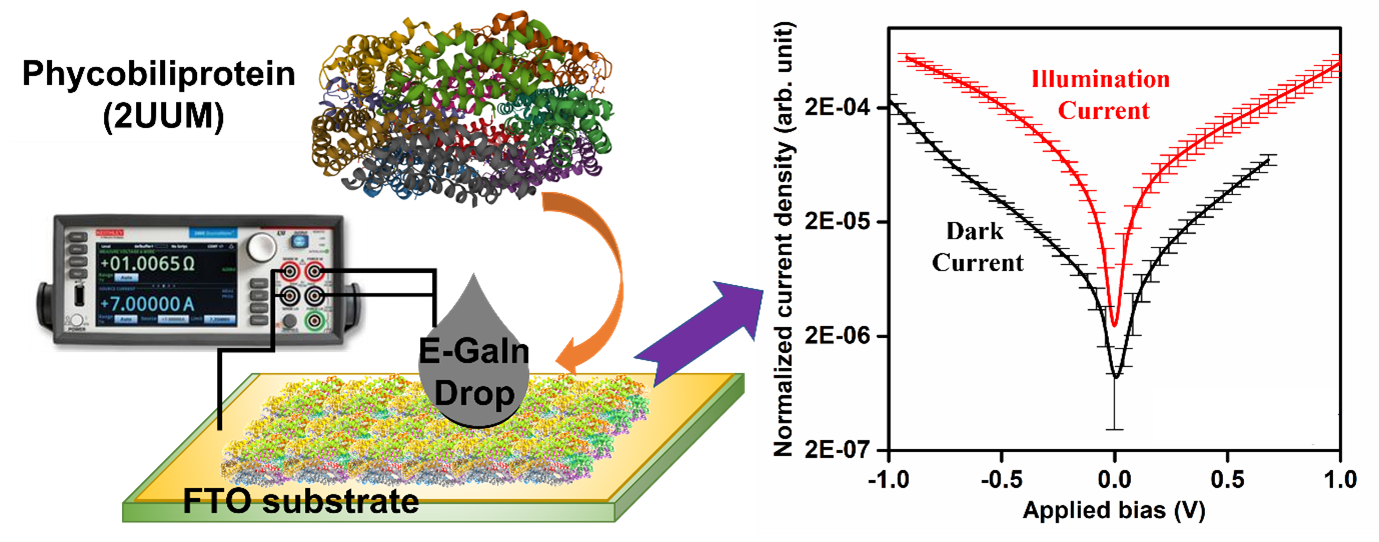 Biomolecules such as proteins, peptides being the most crucial life-forms, have an intimate relationship with various life activities for biological functions. The contemporary work with biomolecules mainly focuses on its evolving potential associated with nanoscale electronics where proteins and peptides are integrated as sensing materials. The researchers explored the optoelectronics functionality of combined proteins known as phycobiliproteins. They investigated electron transport behavior across the phycobiliproteins films under dark and white light illumination. The research affirms that the photochemical activity of the protein is more stable in a solid-state/ thin-film with tightly bonded water molecules than its presence in a buffer solution. Furthermore, the studies demonstrate that phycobiliproteins films modulate their electrical conductivity within their different conformation states. Researchers speculate that the electrical conductance variation could originate from the chemical alteration of cysteine-conjugated bilin chromophores to protein and the electrostatic environment around the chromophores.
Biomolecules such as proteins, peptides being the most crucial life-forms, have an intimate relationship with various life activities for biological functions. The contemporary work with biomolecules mainly focuses on its evolving potential associated with nanoscale electronics where proteins and peptides are integrated as sensing materials. The researchers explored the optoelectronics functionality of combined proteins known as phycobiliproteins. They investigated electron transport behavior across the phycobiliproteins films under dark and white light illumination. The research affirms that the photochemical activity of the protein is more stable in a solid-state/ thin-film with tightly bonded water molecules than its presence in a buffer solution. Furthermore, the studies demonstrate that phycobiliproteins films modulate their electrical conductivity within their different conformation states. Researchers speculate that the electrical conductance variation could originate from the chemical alteration of cysteine-conjugated bilin chromophores to protein and the electrostatic environment around the chromophores.
The research explores the photochemical properties and electrical transport efficiency of phycobiliproteins (PBPs) films. In addition, it investigates the optoelectronics functionality of PBPs films by studying electron transport behavior across the protein films under a dark state and white light illumination. The researchers proposed to develop a photodetector with the protein film in the future.
- Published in Biology News, Departmental News, News, Physics News, Research News
Embarking on a new journey with pride
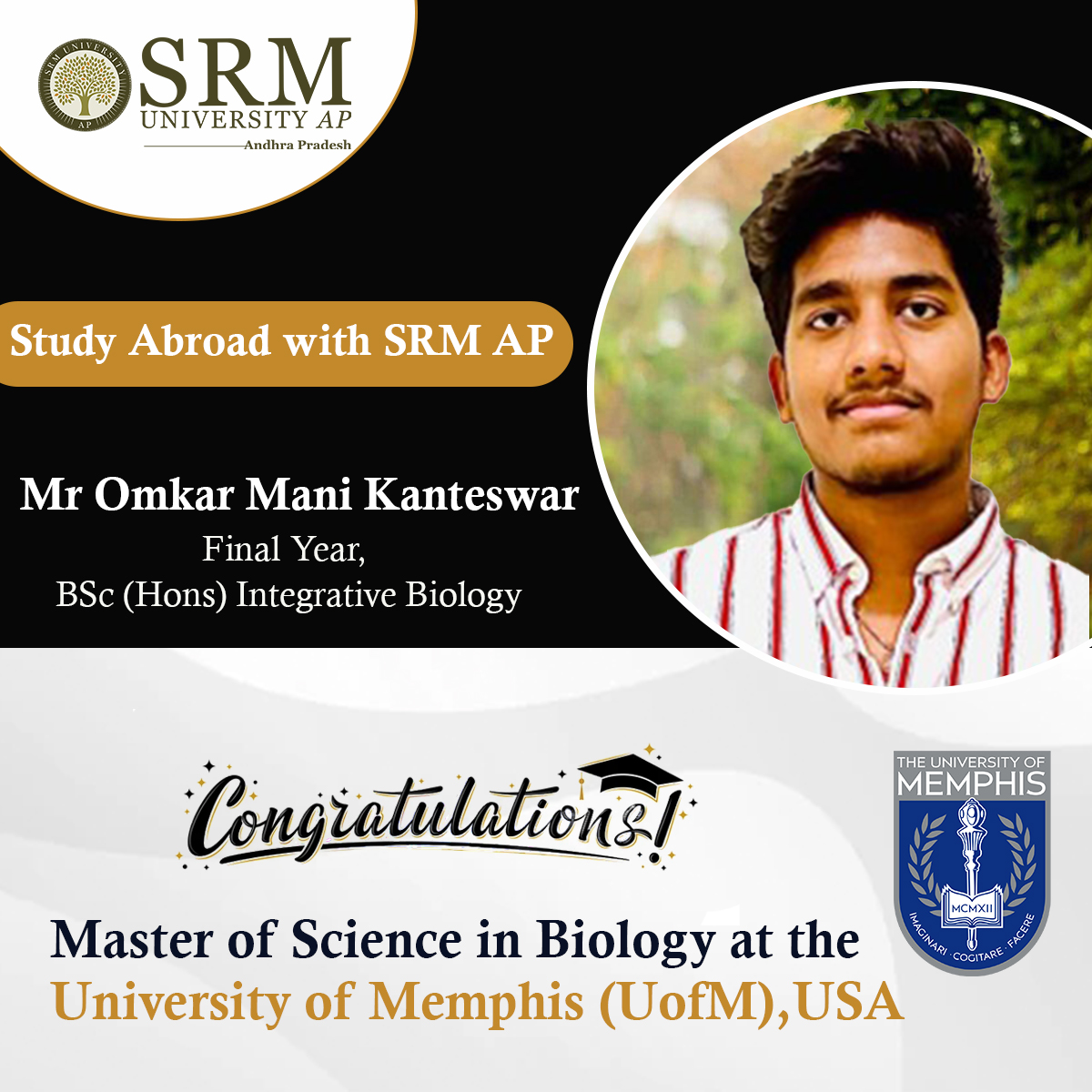 Final year BSc (Hons) Integrative Biology student Mr Omkar Mani Kanteswar has received an admission offer for the Master of Science in Biology at the University of Memphis (UofM), USA. Omkar’s happiness has no bounds as he really worked hard to get into his dream university.
Final year BSc (Hons) Integrative Biology student Mr Omkar Mani Kanteswar has received an admission offer for the Master of Science in Biology at the University of Memphis (UofM), USA. Omkar’s happiness has no bounds as he really worked hard to get into his dream university.
The University of Memphis is a public research university in Memphis, Tennessee. Since Omkar is from a Bsc Biology background, he wanted to continue in the same research field. While shortlisting the universities, he found this research-oriented college. He passed the Duolingo test and IELTS to get into this college.
The Master of Science (MS) in Biology is a research-centred degree programme with an intensive core and elective curriculum. Omkar opted for this course owing to the fact that he wanted to continue his research in the field of Biology. His message for the junior batches is to be confident and independent to make their own decisions and not run with the herd. He urges them to focus on holistic development and extracurricular activities. He is also ready to provide support to them if they need any.
He extended his gratitude to the faculty members who helped him a lot in the process by giving him confidence. He was glad to have them because they consistently and positively helped him in his academics and choosing various colleges. Faculty from the Department of Biological Sciences- Prof Jayaseelan Murugaiyan (HOD), Assistant Professor Sutharsan Govindarajan, and Prof Imran Pancha hold significant positions in Omkar’s career venture.
Admission to a reputed institute means a sense of pride, the joy of knowing you would study the best things with the best ones. Omkar believes that this is just the beginning, and he is yet to do a lot more things with his precious life.
- Published in Biology News, Students Achievements
Optimised copper nanoclusters for bio imaging applications
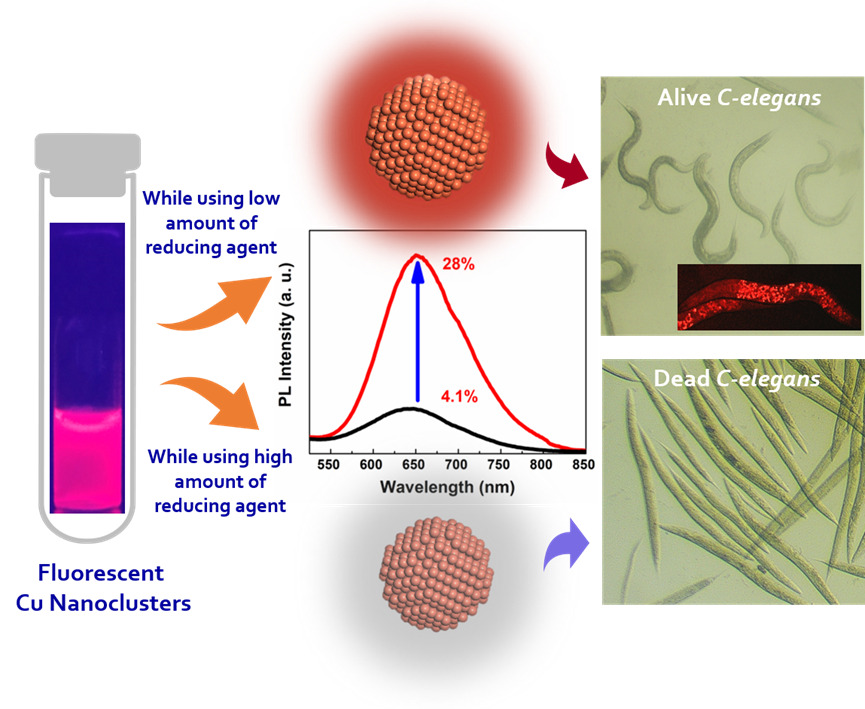
Inspite of being a plentiful and inexpensive metal, the use of copper nanoclusters is limited in bio-medical research because of their toxicity and low stability due to its easily oxidizable nature. It also has a low quantum yield. The interdisciplinary publication of the researchers at SRM University-AP successfully addressed these constraints, resulting in strong fluorescence, superior colloidal stability, and non-toxicity of copper nanoclusters for bio imaging applications. The research was a collective work of Dr Manjunatha Thondamal from the Department of Biological Sciences, Dr Mahesh Kumar Ravva and Dr Sabyasachi Chakrabortty from the Department of Chemistry along with their PhD scholars; Mr Kumar Babu Busi, Ms Kotha Jyothi, Ms Sheik Haseena, Ms Shamili Bandaru and Ms Jyothi Priyanka Ghantasala.
The article titled ‘“Engineering colloidally stable, highly fluorescent and nontoxic Cu nanoclusters via reaction parameter optimization” was featured in the prestigious Q1 journal RSC Advances (IF: 4.036), published by the ‘Royal Society of Chemistry’. They successfully prepared the protein stabilised copper nanoclusters inside the aqueous medium with exceptional optical properties. To the best of their knowledge, the reported colloidal stability and quantum yield of their as-synthesized Cu NCs are the highest reported in the literature, where the emission wavelength is in the red region. Also, optimised copper nanoclusters showed excellent biocompatibility towards solid cancer cell lines and C. elegans as in vitro and in vivo environments. Thus, these red colour luminescent copper nanoclusters were becoming a suitable fluorescent probe for deep tissue penetration, photodynamic, photothermal and diagnostic applications.
Abstract of the Research
Metal Nanoclusters (NCs) composed of the least number of atoms (few to tens) became very attractive for their emerging properties owing to their ultrasmall size. Preparing copper nanoclusters (Cu NCs) in an aqueous medium with high emission properties, strong colloidal stability, and low toxicity has been a long-standing challenge. Although they are earth-abundant and inexpensive, they are comparatively less explored due to their limitations such as ease of surface oxidation, poor colloidal stability, and high toxicity. To overcome these constraints, we established a facile synthetic route by optimizing the reaction parameters, especially altering the effective concentration of the reducing agent to influence their optical characteristics. The improvement of photoluminescence intensity and superior colloidal stability was modelled from a theoretical standpoint. Moreover, the as-synthesized Cu NCs showed a significant reduction of toxicity in both in vitro and in vivo models. The possibilities of using such Cu NCs as a diagnostic probe towards C. elegans were explored. Also, the extension of this approach towards improving the photoluminescence intensity of the Cu NCs on other ligand systems was demonstrated.
- Published in Biology News, Chemistry-news, Departmental News, News, Research News
Dr Anil K Suresh and team exploring novel domains of research at SRM AP!
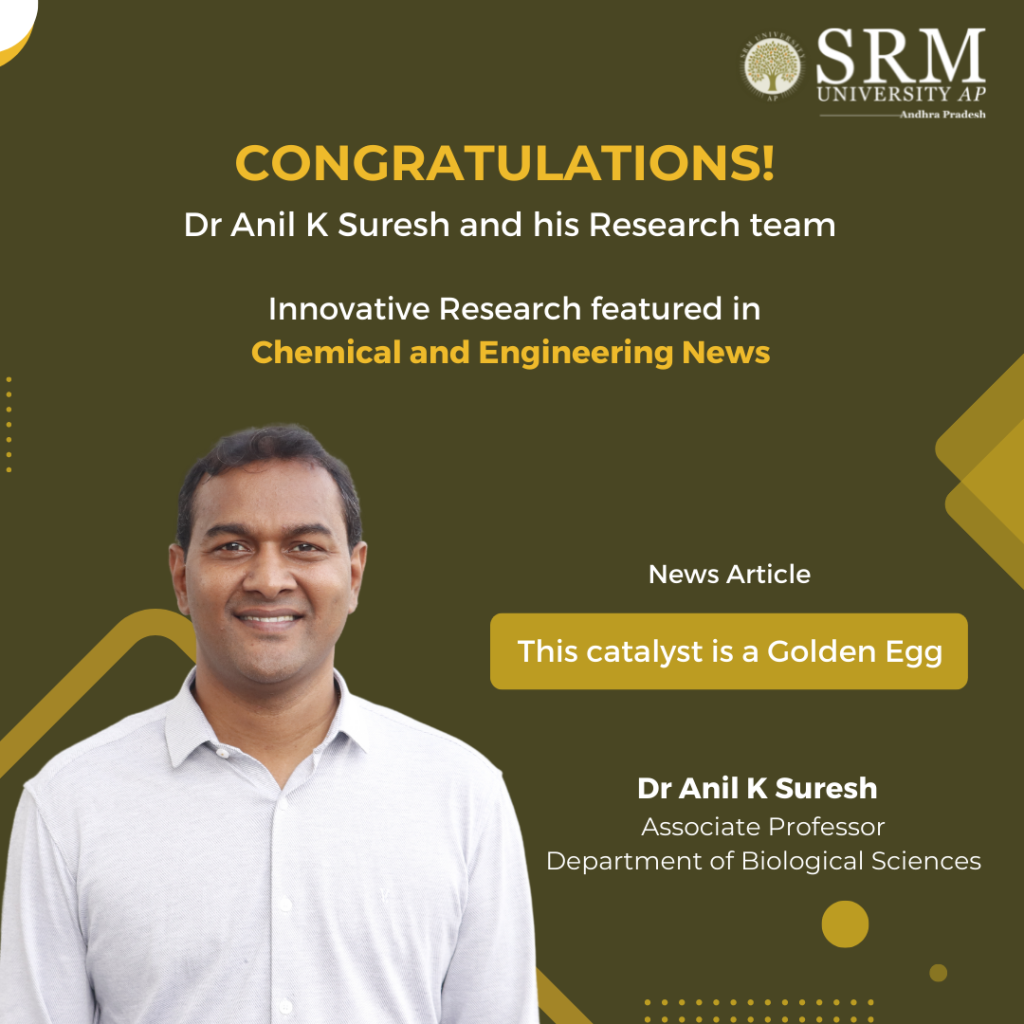
SRM AP proudly congratulates Dr Anil K Suresh, Associate Professor, Department of Biological Sciences and his cohort of research scholars for their rare achievement of having their paper featured in the prestigious weekly news magazine Chemical and Engineering News (ACS-C&EN). The news article titled “This catalyst is a Golden Egg“, edited by Prachi Patel highlights the innovative research conducted by Dr Anil K Suresh and his team on developing a low-cost, sustainable catalyst by infusing eggshells with gold nanoparticles that can be reused and eventually recycled.
The research paper titled Sustainable Bio-Engineering of Gold structured Wide-Area Supported Catalyst for Hand-Recyclable Ultra-Efficient Heterogeneous Catalysis (ACS Appl. Mater. Interfaces 2022, DOI: 10.1021/acsami.2c13564) highlights the team’s breakthrough advance in impregnating eggshells with gold nanoparticles to develop a cheap, and reusable ‘mega catalyst’. The research has used the robust “mega catalyst” to detoxify dye waste and run other organic reactions by dropping the eggshell catalyst into reaction solutions.
Dr Suresh and colleagues dipped waste eggshells collected from restaurants in a suspension containing gold chloride for 6 hours. Consequently, the amino acids on the shells reduced the gold ions to form crystalline gold nanoparticles. Dr Suresh attested this method to be one of the simplest syntheses of a supported catalyst that was ever reported. He emphasised that he and his colleagues have also grafted catalytic silver and copper oxide on eggshells and are now working on methods to do this for platinum and palladium.
SRM University-AP manifests pioneering advancement in innovative domains of research in the field of science and technology. The breakthrough research by Dr Anil K Suresh and his research team is of outstanding achievement and incredible addition to the institution’s laurels in the field of translational research.
- Published in Biology News, Departmental News, Faculty Achievements, News, Research News
Symposium on Cell and Molecular Biology (SCMB-2023)
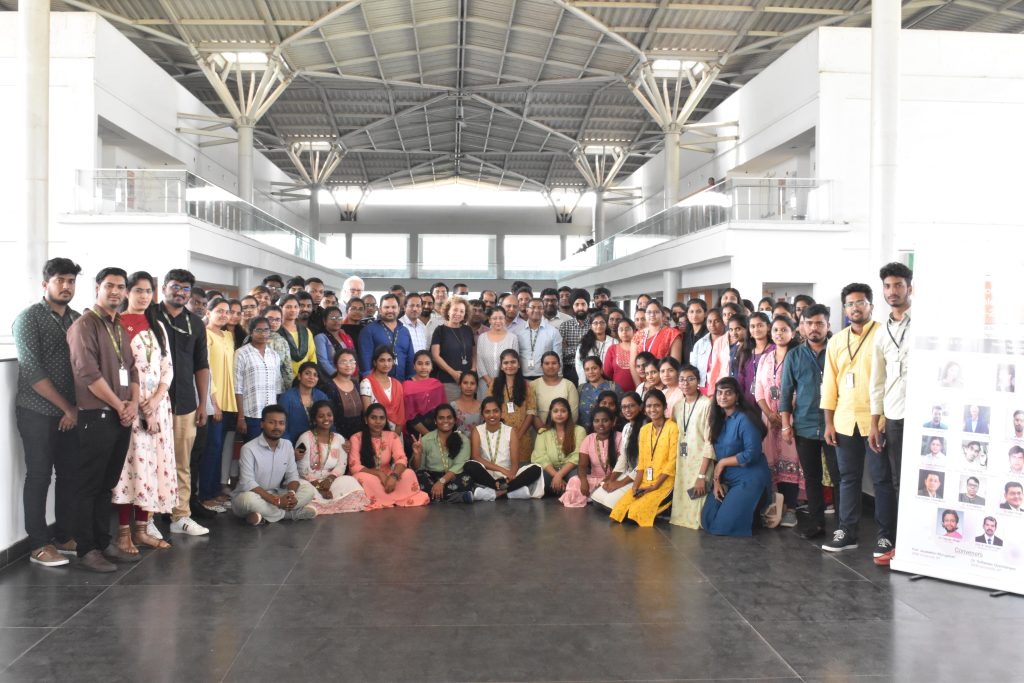
Cell and molecular biology is a vast field that encompasses many different areas of research, from genetics to immunology, from biochemistry to the study of single-cell sequencing. In order to emphasise the on-going research in cell and molecular biology, The Department of Biological Sciences organised a two-day Symposium on Cell and Molecular biology (SCMB-2023) from February 16 to 17, 2023, at SRM University-AP. The symposium consisted of insightful talks by eminent speakers from different parts of India and abroad, including the Hebrew University (Israel), Technion-Israel Institute of Technology (Israel), Biological Research Centre (Hungary), Weizmann Institute of Science (Israel), The AMR Insights (The Netherlands), Indian Institute of Science, IIT-Jodhpur, CSIR- Institute for Microbial Technology, IIIT-Delhi and more. A pre-symposium workshop on computational handling of biological data was another highlight of the convention.
Pre-symposium Workshop
In the past decade, the use of computational tools and algorithms to analyze data or use of artificial intelligence to model biological systems and predict how they will behave under different conditions have increased extensively. With an aim to give the basic knowledge of how this computational approach works, the Department of Biological Sciences invited Dr Gaurav Ahuja and Miss Aayushi Mittal to have a hands on session on:
- Building Machine Learning models leveraging biological datasets in R-programming.
- Using AutoML techniques for building classification and regression models (Biological datasets)
- Case study with Metabo Killer Python Package (Mittal et al. 2022, Nature Chemical Biology).
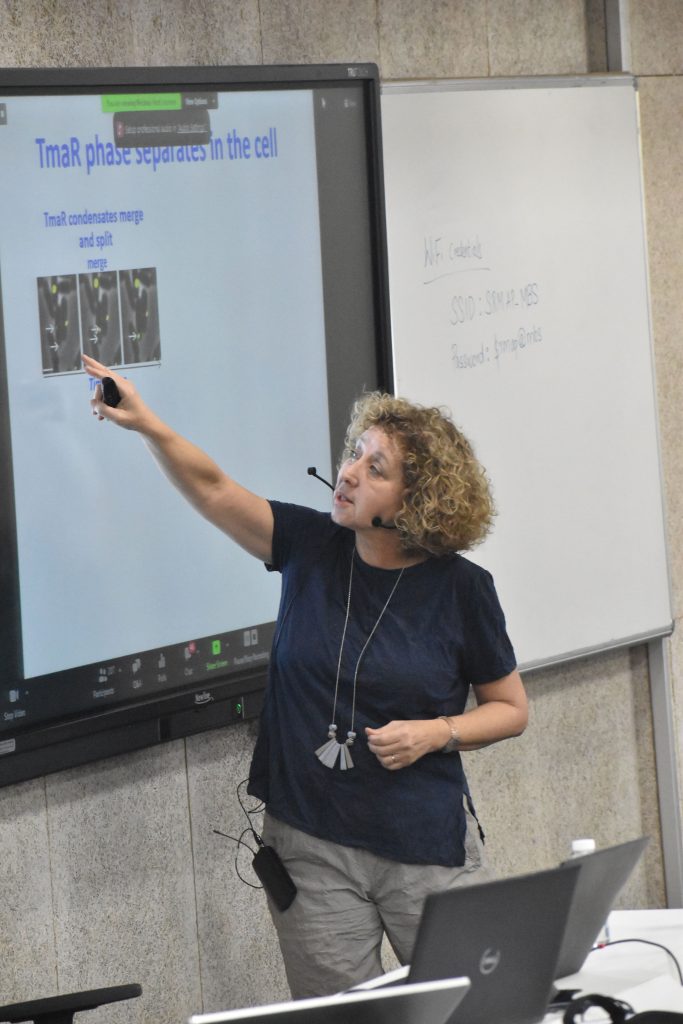
Symposium talks
Among all the eminent speakers the keynote speakers for the symposium were Prof. Orna Amster-Choder, Hebrew University of Jerusalem, Israel and Prof. Motti Choder, Technion- Israel Institute of Technology who gave an insight on gene expressions. With all the hot topics of cell and molecular biology starting right from ribosomal role in diseases, protein quality control in neurodegeneration and its therapy, the speakers also spoke about different model system and techniques, for instance bacterial nanotubes in intercellular interactions, use of Caenorhabditis elegans for host pathogen interaction, CRISPR-Cas3 systems for large-scale genome manipulation and gene discovery and Pseudouridine RNA modification. These insightful talks on data analytics and cell and its regulation not only provided the participants with brainstorming sessions, it also provided a platform to discuss and channelise new thoughts.
The conference was jointly convened by Prof. Jayaseelan Murugaiyan, Head of the Department of Biological Sciences, SRM University-AP, India and Dr Sutharsan Govindarajan, India Alliance Early Career Fellow and Assistant Professor at SRM University-AP. The symposium was held in a hybrid mode aimed to reach more budding scientists and established researchers. The target audience of the symposium included undergraduate students, postgraduate students, doctoral and post-doctoral scholars and researchers across the world. Participants from over nine institutes took part in the offline mode with a majority being undergrad students, whereas online participation witnessed registration from 327 institutes. The symposium had 120 offline participants and 572 online participants from 19 countries; 26 states and 3 union territories within India.
- Published in Biology News, Departmental News, News, Sympossium
SERB- SURE Grants: 10 projects worth 2.50 crores awarded to SRM AP
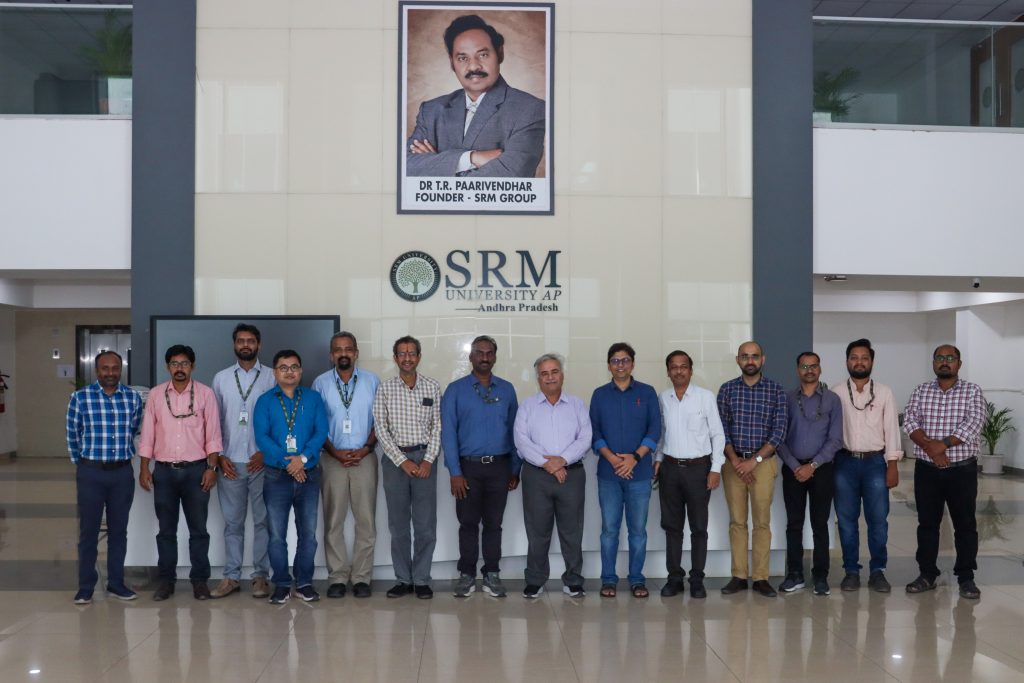
The faculty of SRM University-AP have been awarded 10 projects worth 2.50 crores from the Science and Engineering Research Board (SERB-SURE). Department of Science and Technology (DST) received a total of 2000 proposals, of which 466 were sanctioned. Among the 466 projects, 151 projects were awarded to Private Universities. Of the 151 projects approved to state private universities and colleges throughout India, the five-and-a-half-year young varsity was awarded 10 projects. 10 professors from various Science and Engineering Departments brought this incredible achievement to the university.
SERB-SURE is a research grant scheme initiated by the Science and Engineering Research Board (SERB) in India to provide financial support to young researchers in the early stages of their careers. The grants are intended to support research in basic and applied sciences, engineering, and technology and is typically granted for a period of three years.The SERB-SURE scheme is one of several initiatives by SERB to promote scientific research in India and support the development of a strong research community in the country.
“It is a milestone achievement that resonates with the University’s unparalleled commitment for excellence. We are striving towards research-intensive learning to build cutting-edge innovation for a transformative tomorrow”, commented Vice Chancellor, Prof. Manoj K Arora. The Executive Director-Research of SRM Group, Prof. Narayana Rao said that, “SRM University-AP has travailed hard to achieve the world-class scientific temperament that we now advocate, and this achievement is a testimonial recognition of all our efforts.” The prestigious grants were sanctioned to the faculty in the on-going domains of Quantum Kinetic Approach, Antimicrobial Resistance (AMR) Profiling and Changing of Hydroclimatic conditions in Bay of Bengal among 7 others.
Dean-SEAS, Prof. Ranjith Thapa said, “These research could be path-breaking and could offer a solution to many of the societal difficulties.” Prof. Jayaseelan Murugaiyan, Dr Sandeep Singh and Dr Pitchaiah Cherukuri of the Department of Biological Sciences; Dr Sabyasachi Chakrabortty, Dr V S Baswanth Oruganti of the Department of Chemistry; Dr Debabrata Pramanik, Dr Ravi Kumar and Dr Pankaj Bhalla of the Department of Physics ; Dr Sandeep Kumar Verma of the Department of Mathematics; Dr Uma Maheswar Arepalli of the Department of Civil Engineering; and Dr Kousik Das of the Department of Environmental Science and Engineering were awarded the grants.
- Published in Biology News, Chemistry-news, CIVIL NEWS, Departmental News, ENVS News, Math News, News, Physics News, Research News
MoU with NITTE (Deemed to be University) to foster research in Biological Science
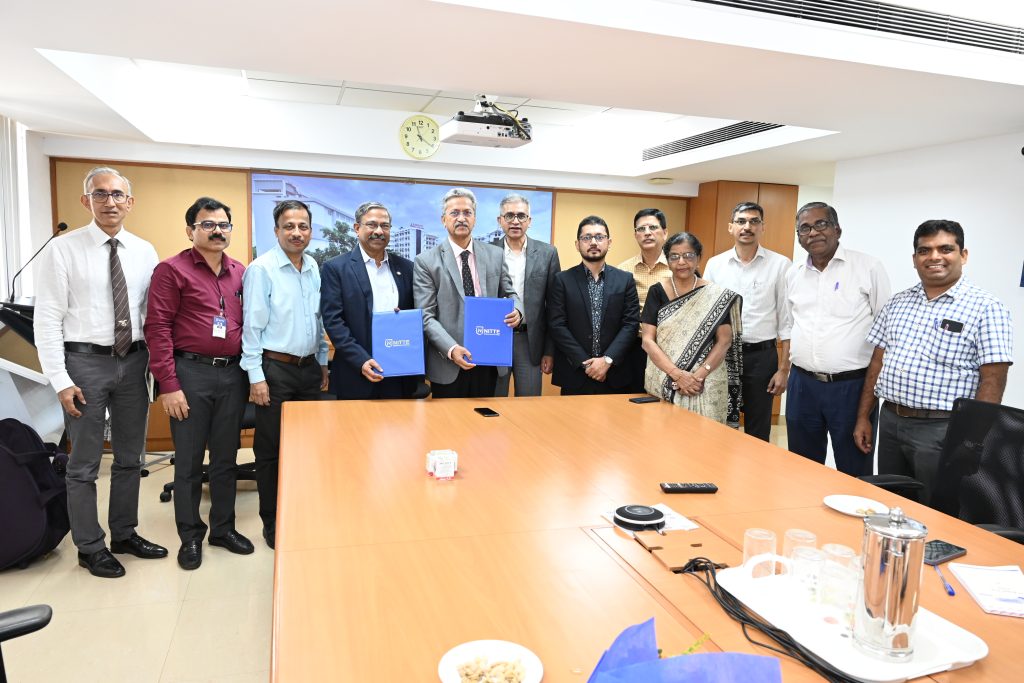
SRM University-AP inked an MoU with NITTE (Deemed to be University), Mangalore, on June 16, 2023, to promote academics and research in Biological Science. The MoU was signed at the NITTE Mangalore campus by Dr R Premkumar, Registrar, SRM University-AP and Prof. Dr Harsha Halahalli, Registrar, NITTE, in the presence of Prof. Dr MS Moodithaya, Vice-Chancellor, NITTE.
Prof. Dr MS Moodithaya termed this association a very important one for the university and expressed his confidence that the formal agreement will foster a mutually beneficial relationship through knowledge exchange, academic excellence, and research of societal relevance between the Universities. “I hope this collaboration can leverage both university’s strengths and complementary skills to undertake research projects that require a combination of expertise. I look forward to the synergy leading to more comprehensive and impactful research outcomes”, commented Prof. Manoj K Arora, Vice Chancellor, SRM University-AP, in response to the MoU.
Prof. Jayaseelan Murugaiyan, Head-Department of Biological Sciences, SRM University-AP and Dr Krishna Kumar, Associate Professor, NITTE University Centre for Science, Education and Research (NUCSER), have been collaborating for the last couple of years in the field of antimicrobial resistance. Prof. Anirban Chakraborty, Director- NUCSER and Prof. Jayaseelan Murugaiyan, SRM University-AP, are the authorised representatives from the respective universities. The Director, R&D; Director, Projects and DST-NUTEC; Director, Academia- Industry collaborations; Director, Institute Innovation Council; and Director, PG Studies and Clinical Research were among the others present on this occasion.
- Published in Biology News, Departmental News, MoU, News


